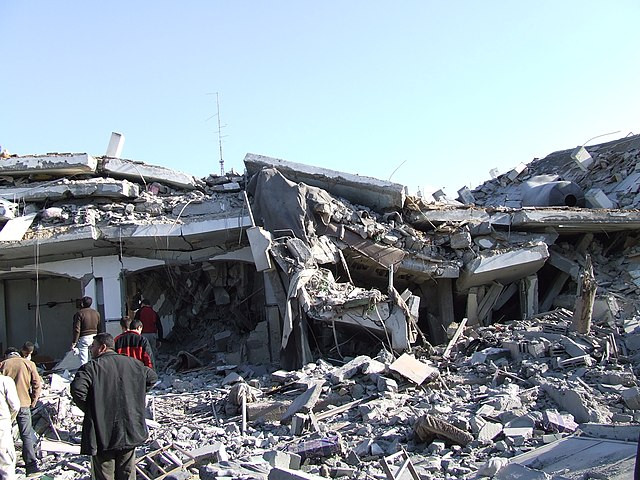As the one-year anniversary of Hamas' surprise attack on Israel approaches, thousands of protesters took to the streets across the globe on Saturday to demand an end to the ongoing violence in Gaza and the wider Middle East. From New York to Paris, London to Cape Town, demonstrators called for peace and urged governments to halt military interventions that have claimed tens of thousands of lives over the past year.
In London, approximately 40,000 pro-Palestinian demonstrators marched through the heart of the city, waving Palestinian flags and chanting for an arms embargo on Israel. Similar scenes unfolded in cities like Paris, Rome, and New York, where protesters voiced their outrage at the ongoing conflict. In New York's Times Square, protesters donned black-and-white keffiyeh scarves and held signs reading "Free Palestine" while chanting "Gaza, Lebanon you will rise, the people are by your side."
This latest wave of protests coincides with the anniversary of the Oct. 7, 2023, Hamas attack on southern Israel, which killed 1,200 Israelis and saw over 250 people taken hostage. Israel's subsequent military campaign in Gaza has killed nearly 42,000 Palestinians, according to Gaza's health ministry, and displaced most of the enclave's 2.3 million residents. The violence has spread beyond Gaza, pulling in neighboring Lebanon and even Iran-backed groups from Iraq and Yemen.
"We need to be out on the streets in even bigger numbers to stop this carnage and stop Britain being drawn into it," said Ben Jamal, director of the Palestine Solidarity Campaign in Britain. Many protesters, like Jamal, expressed frustration over their governments' continued support for Israel's military actions. "The Israeli government does not take any notice, and they just go ahead and continue their atrocities in Gaza, now also in Lebanon," lamented Agnes Kory, a protester in London.
Counter-protests, however, have also gained momentum, with many expressing support for Israel's right to defend itself. In London, a small group of demonstrators waved Israeli flags as the larger pro-Palestinian crowd marched by, leading to tense exchanges. London police made 15 arrests on the sidelines of the event, though they did not specify whether those detained were from either group.
In Rome, clashes broke out between protesters and police, resulting in authorities using tear gas and water cannons to disperse the crowds. Despite a ban on protests near the city center, around 6,000 demonstrators gathered, defying the restrictions. In Paris, thousands gathered peacefully at the iconic Republique Plaza, holding banners that read "Stop the Genocide" and "Hands off Lebanon," expressing solidarity with both Palestinians and Lebanese civilians affected by the conflict.
Similar protests were held across Europe, Africa, and the United States, reflecting the broad concern over the escalating violence in the region. In Manila, activists clashed with riot police as they attempted to protest near the U.S. embassy, voicing opposition to American support for Israel. Protests also took place near the White House in Washington, with demonstrators calling on the U.S. government to reassess its alliance with Israel.
Tensions have been rising globally as the conflict shows no signs of abating. Israel has ramped up its military operations in Gaza and launched intensified strikes in southern Lebanon, targeting Hezbollah militants backed by Iran. Israel's actions have drawn significant international condemnation, particularly regarding its operations in Gaza, which have been accused of causing a humanitarian crisis.
Lebanese-French protester Houssam Houssein, who attended the Paris rally, echoed growing concerns that the war could expand beyond Gaza. "We fear a regional war because there are tensions with Iran at the moment, and perhaps with Iraq and Yemen," he said. Many fear that the conflict could engulf the broader Middle East if diplomatic efforts fail to de-escalate the situation.
Despite the protests and international pressure, Israeli Prime Minister Benjamin Netanyahu has stood firm, arguing that the military campaign is necessary to prevent future attacks similar to those carried out by Hamas last October. Netanyahu, with the backing of the U.S., has stated that Israel's actions are in self-defense, aimed at dismantling Hamas and preventing further bloodshed.
U.S. government agencies have also issued warnings ahead of the Oct. 7 anniversary, concerned that the date could trigger violence in various parts of the world. Security measures have been heightened in states like New York, where local officials are bracing for potential unrest.
The conflict's global reverberations are also evident in the increasing reports of antisemitic and Islamophobic incidents tied to the war. Rights advocates have raised concerns about the surge in hate crimes against both Jews and Muslims as tensions between pro-Palestinian and pro-Israeli groups escalate. Scuffles between demonstrators and police were reported in several cities, and authorities across Europe have warned that violence related to the Middle East conflict could worsen in the coming weeks.






